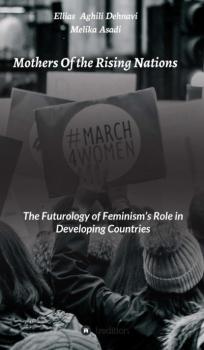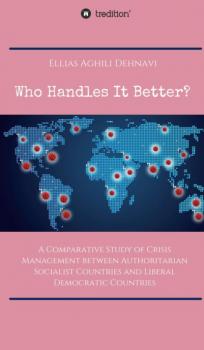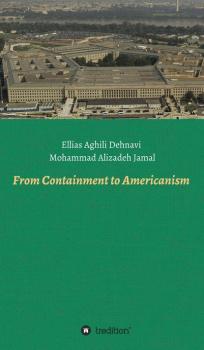Ellias Aghili Dehnavi
Список книг автора Ellias Aghili DehnaviMothers Of the Rising Nations
The discourse upon feminism and feminist movements seems either easy or difficult. Part of its difficulty is due to its variety of orientations that in somehow cause some serious conflicts in the area of opinion and action. On the other hand, besides these varieties in orientations, one can mention the variety of different and contradictory interpretations in feminism, and its achievements and consequences, which implies the necessity of cautious and comprehensive thinking in discourse. Investigating the consequences of feminism in west world, the present writing is seeking to inspect the evolution of present topic in regards to the society of Iran, with a futurology approach. Therefore, in the first section of the book, the feminism in west is delineated and in the next section its future vision in developing countries will be presented.
Who Handles It Better?
In different societies, different models of crisis management are used to deal with the crisis, which is completely influenced by the political system that governs these societies. With the widespread prevalence of the Corona virus, different views have been propounded about the capabilities of different political systems, which are still the subject of debates. The fundamental question that has been raised and examined in this context is how the crisis management in authoritarian socialist countries can be evaluated in comparison with liberal countries? The present research is a descriptive-analytical and the mentioned question has been investigated using the library method. The results of the study indicate that it is not simply possible to distinguish between crisis management of democratic states and authoritarian regimes. Liberal democracies, however, mainly try to use a community-based approach to deal with crises. These systems try to manage crises while paying attention to economic well-being and respecting citizens' rights, but the widespread outbreak of Corona has shown that in many cases liberal democracies have not acted fairly and the working classes are still forced to work in order to turn the wheel of their countries' economy. Of course, the socialist approach of these governments in supporting different classes of people is worth considering. In general, liberal democracies have not been as successful as they should have been in dealing with the Corona virus crisis. On the other hand, although authoritarian socialist regimes such as China were able to control the crisis of the Corona outbreak, they still have been criticized for lack of respect for individual rights, absence of strong protectionist policies, and police actions. However, European liberal democracies, including Italy, France and Spain, have chosen the difficult solution of global quarantine like the world's largest authoritarian powers, such as China, that puts it to action.
Foreign Policy of The 50 Stars
Systems and hypotheses help us sort out the climate of administration in a perplexing territory like international strategy. An assortment of ways of thinking exist about how to move toward international strategy -and specifically, foreign policy -, each with various thoughts regarding what «ought to» be done and finished. These methodologies additionally shift when it comes to the human instincts, the number of different nations engaged with the U.S. foreign policy notions, and what the tenor of unfamiliar policymaking should be. They assist us with arranging the current U.S. ways to deal with numerous international strategy challenges’ around the planet. In the current book I have tried my best to represent and analyze different facets and nuances of the U.S foreign policy in a new way!
Schmitt and Sons
The German economy is a highly developed social market economy. This country has the biggest economy in Europe, the fourth biggest economy in the world based on nominal GDP, and the world’s fifth biggest economy based on GDP (purchase power parity). According to the IMF, Germany held 28% of the Eurozone economy in 2017. Germany is a founding member of the EU and Eurozone. Germany held the record of the biggest global trade surplus worth of 310 billion dollars which made the country one of biggest exporters in the world, and its goods and services exports was 1448.17 billion dollars in 2017. The service sector, industry, and agriculture hold 70, 29.1, and 0.9 percent of the total share of Germany’s GDP, respectively. Exports of Germany encompasses 41% of its national output. Germany’s top 10 exported good are vehicles, machinery, chemical products, electronic products, electric tools, medical products, transportation equipment, base metals, food products, rubber, and plastic. The German economy is the biggest production economy in Europe, and it is less likely to take effect from the financial stagnation. The country conducts applied research with real industrial value. The German economy is considered as a bridge between the latest academic insights and product advancements and industry-oriented process, producing a big deal of knowledge in its laboratories. In July 2017, the IMF issued another "good health status” for the economy of Germany, providing recommendations for maintaining this level in long run. The current book probes and studies the reasons and roots for Germany’s industrial and economical progress.
Waking Up From An American Dream
The foreign policy of the United States is its interactions with foreign nations and how it sets standards of interaction for its organizations, corporations and system citizens of the United States. The officially stated goals of the foreign policy of the United States of America, including all the Bureaus and Offices in the United States Department of State, as mentioned in the Foreign Policy Agenda of the Department of State, are «to build and sustain a more democratic, secure, and prosperous world for the benefit of the American people and the international community». In addition, the United States House Committee on Foreign Affairs states as some of its jurisdictional goals: «export controls, including nonproliferation of nuclear technology and nuclear hardware; measures to foster commercial interaction with foreign nations and to safeguard American business abroad; international commodity agreements; international education; and protection of American citizens abroad and expatriation». U.S. foreign policy and foreign aid have been the subject of much debate, praise and criticism, both domestically and abroad. In this book, we have done our best to analyze the strange but rooted method that Donald Trump has applied and imposed on his department of states' blueprints; a mixture of Jacksonism and the politics of containment can be still seen in Trump's notions; how he deals with the countries of opposition can be named as the politics of containment. If you are interested in reading a book which depicts his strange but yet traditional politics of Donald Trump, this is your book! You may wake up from your American Dream after finishing reading this book!
Perspectives Of A Resistance
The Russian Federation is undoubtedly one of the major actors and powers in international organizations, especially the United Nations and the Security Council, and is one of the growing economic powers of the world which has been on the trajectory of rapid development with a new strategy that focuses on educating the younger generation. In this book, we have chosen an important page of the Russian history (the Battle of Stalingrad) and discussed different factors and issues in regard to this event.
The Lost Black Fawn
Among the ethnic groups, the poorest one in the USA is American Indians. Some of the realities and problems of American Indians include lower opportunities for education, a high rate of unemployment, homelessness, issues of permanent residency, psychological problems, geographic isolation, and drug abuse. For instance, 27% of American Indian households are below the poverty level, while it is about 11.6% among whites in the world. In addition, American Indians tolerate more violent crime compared to other ethnic groups in the United States. They are subject to such crimes like murder, aggression, gang violence, human and drug trafficking, and illegal migration through tribal lands. They also experience the highest rate of imprisonment in the USA. The Indians also face a lack of respectfulness to their culture from other ethnic groups, specifically from the whites. Such cultural incompetency or lack of cultural respect is partly originated from racial discrimination that is imposed on American Indians. Using discrimination theory, we can understand the relation between racial discrimination and the social challenges faced by American Indians. If Native Americans retrieve their cultural competences, the challenges they face can be mitigated. We have done our best to present some feasible results in order to solidify our problem and subject matter using mass surveys which have been done previously by Mary G Findling, Logan S. Casey, Stephanie A. Fryberg, Steven Hafner, Robert J. Blendon, John M. Benson, Justin M. Sayde, and Carolyn Miller from the universities of Harvard, Michigan and North Texas.
From Containment to Americanism
The present book examines the national security strategies of the presidents of the United States of America after World War II. The main question that has been asked in this regard is what approaches have these national security strategies had after the World War II? The present project is an analytical descriptive study done through interviews and library sources. Research shows that each of the American presidents had a national strategy in the aftermath of World War II, and in the post-World War II period, the US National Security Strategy has always had a global approach.
Do It As Wilson Says
Generally, four approaches to US foreign policy can be explained. According to the tradition of Jackson-ism, the United States, as the dominant power, provides global leadership to stabilize the political order and regulate the international economic system, and to prevent the emergence of a dominant power in order to maintain the balance of global power. According to the tradition of Hamiltonianism, the United States avoids thorny external obligations that harm its economy, society, and system of government. St. Wilsonian believes that the United States should support foreign freedom by expanding free markets, democracy, human rights, and national autonomy. The present study examines the Wilsonian approach concerning US foreign policy.








